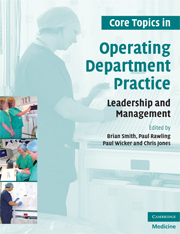Book contents
- Frontmatter
- Contents
- List of contributors
- Foreword
- Preface
- 1 Managing change in perioperative education
- 2 The role of the operating department manager within the context of the organization
- 3 Action learning: a new way of problem solving in perioperative settings
- 4 Agenda for change: what do theatre staff need to know?
- 5 The SWOT analysis: its place in strategic planning in a modern operating department
- 6 Corporate governance: setting the scene for perioperative practice
- 7 Managing different cultures: adversity and diversity in the perioperative environment
- 8 Leadership in perioperative settings: a practical guide
- 9 Management and leadership of advanced practice
- 10 Managing conflict in perioperative settings
- 11 The management and organization of emergency operating lists
- 12 Organizational culture
- 13 Development matters in the NHS; including a perioperative approach to the KSF
- 14 Equipment procurement: a purchaser's guide for theatre managers
- 15 The reflective practitioner in perioperative settings
- 16 New ways of working in perioperative practice
- 17 Damned if you do and damned if you don't: whistle blowing in perioperative practice
- 18 A manager's experience of recruitment and retention
- 19 The management of change
- Index
- References
9 - Management and leadership of advanced practice
- Frontmatter
- Contents
- List of contributors
- Foreword
- Preface
- 1 Managing change in perioperative education
- 2 The role of the operating department manager within the context of the organization
- 3 Action learning: a new way of problem solving in perioperative settings
- 4 Agenda for change: what do theatre staff need to know?
- 5 The SWOT analysis: its place in strategic planning in a modern operating department
- 6 Corporate governance: setting the scene for perioperative practice
- 7 Managing different cultures: adversity and diversity in the perioperative environment
- 8 Leadership in perioperative settings: a practical guide
- 9 Management and leadership of advanced practice
- 10 Managing conflict in perioperative settings
- 11 The management and organization of emergency operating lists
- 12 Organizational culture
- 13 Development matters in the NHS; including a perioperative approach to the KSF
- 14 Equipment procurement: a purchaser's guide for theatre managers
- 15 The reflective practitioner in perioperative settings
- 16 New ways of working in perioperative practice
- 17 Damned if you do and damned if you don't: whistle blowing in perioperative practice
- 18 A manager's experience of recruitment and retention
- 19 The management of change
- Index
- References
Summary
Key Learning Points
Understand the different drivers for the development of advanced roles
Examine the common characteristics of an advanced role
Define advanced practice and examination of the common characteristics of advanced roles
Understand the issues involved in management of advanced practitioners and leadership of a team to advance the quality of service
Introduction
One of the defining characteristics of living in the twenty-first century is adapting to the changes that have been prompted by evolving technological, political, economic and social developments.
Healthcare practice has not been immune to these influences (World Health Organization 2002, 2006). Comparing current healthcare practice with that of the 1970s reveals a whole career's worth of development and adaptation to these differing patterns of disease and healthcare provision. An operating department manager and leader must recognize this fact (Kay 2005) and not only deal with its impact but, more importantly, also proactively anticipate possible changes or shifts of emphasis so that manager and team are able to adapt and meet the opportunities and challenges they may pose (Dubois et al. 2006).
The PEST analysis
The PEST analysis (political, economic, social and technological factors; QuickMBA 2008) is one way of considering the impact of various factors on the role of the advanced practitioner.
There has been no single revolutionary force promoting the development of the non-medically qualified advanced practitioner. The origins of the advanced practitioner have been much more evolutionary, organic and complex, as healthcare systems worldwide have risen to the combined challenges presented by these external forces.
Information
- Type
- Chapter
- Information
- Core Topics in Operating Department PracticeLeadership and Management, pp. 65 - 72Publisher: Cambridge University PressPrint publication year: 2009
